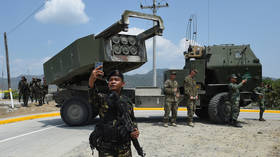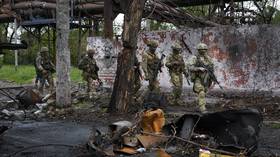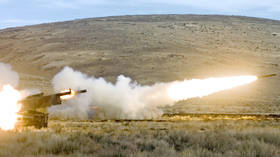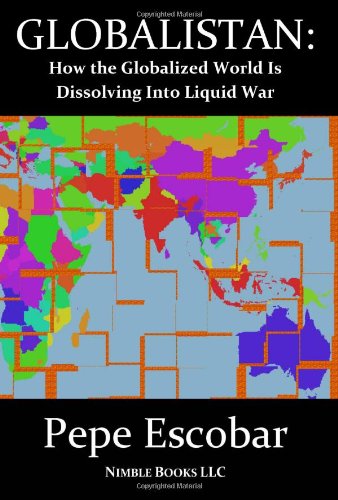Does Russia’s Ukraine Experience Increase or Reduce the Likelihood That China Will Invade Taiwan?
by Ted Galen Carpenter
There continue to be sharply competing narratives about what relevance Russia’s invasion of Ukraine might have for the Taiwan issue. One school of thought contends that Moscow’s flagrant violation of international norms against using force to deal with a territorial dispute might encourage the People’s Republic of China (PRC) to do the same to resolve the long-festering problem of Taiwan’s political status. That is especially true, proponents assert, if Vladimir Putin’s government succeeds in achieving its objectives: forcing Kyiv to renounce ambitions to join NATO, accept the territorial amputation of Crimea, and recognize the "independence" of the secessionist Donbas statelets.
The opposing thesis argues that because the Russian offensive has been slower, much more difficult, and more costly in both treasure and blood than the Kremlin ever imagined, those bitter lessons are likely to reduce any temptation that PRC leaders might harbor to adopt a similar aggressive strategy toward Taiwan. According to that reasoning, Russia’s failure to achieve a quick, decisive, and low-cost victory in Ukraine has caused Beijing to realize that attempting to conquer the island could be far more difficult and costly than previously thought. Therefore, an invasion of Taiwan has become less likely.
When considering the likely impact of the Ukraine war on Taiwan’s probable future it is imperative to recognize one important similarity between the two issues. In both cases, the great power involved made it clear that there were "red lines" that dare not be crossed. For Russia, it was the West’s continuing effort to make Ukraine a NATO military asset For the PRC, a key red line is any effort on Taiwan’s part to achieve formal independence. Indeed, Taipei’s continuing refusal to discuss unification with the mainland under Beijing’s formula of "one country, two systems" may ultimately prove to be a provocation sufficient to push matters over the edge.
Beijing’s warnings against Taipei’s persistent, sometimes bold separatist actions that have taken place during Tsai Ing-wen’s administration are becoming noticeably more emphatic. So, too, are the warnings to "outside powers" – principally the United States and Japan – against encouraging and facilitating such ambitions. Again, the similarities between the PRC’s posture and Putin’s steadily escalating warnings to NATO about Ukraine are striking.
Washington, though, has pressed ahead with its support for Taiwan, just as it blew through red light after red light regarding NATO’s expansion to Russia’s border. Throughout Donald Trump’s presidency, security cooperation between the United States and Taiwan increased to the point that it began to look like a full-fledged military alliance. Under President Biden, that trend has continued unabated. Biden’s repeated statements that Washington has an obligation to defend Taiwan from attack have generally been dismissed as gaffes from a notoriously gaffe-prone individual, since the U.S. commitment under the 1979 Taiwan Relations Act is far more limited and vague. However, US actions under both Trump and Biden suggest that that the president is accurately describing Washington’s actual policy.
PRC leaders likely would prefer to avoid resorting to force to deal with the Taiwan issue. However, Washington needs to understand that Taiwan is a vital interest to China, just as Ukraine was and is a vital interest to Russia. When vital interests are involved, great powers usually do not hesitate to use military force, if they believe that such a course has become necessary. US leaders need to take Beijing’s warnings about Taiwan much more seriously than they have to this point, or they risk making the same miscalculation that they did regarding NATO’s provocative relationship with Ukraine.
If peace breaks down in the Taiwan Strait, the crisis could prove even more disruptive and dangerous than the ongoing Russia-Ukraine war. Even the latter conflict has caused significant economic distress, as all such events tend to do. An array of economic sanctions that the United States and its allies imposed on Russia has caused additional dislocations. It is important to note that although Ukraine is a significant source of food and energy supplies, the country is not a major economic player in most other respects. Even so, the negative consequences of the war have been far from trivial.
Both Taiwan and the PRC are much more important to the global economy. Taiwan is a major semiconductor production center, and the island is the leading supplier of the most advanced microchips. Overall, Taiwan ranks as the world’s 22nd largest economy, measured by size of Gross Domestic Product, while the PRC as the world’s second largest economy is even more important. Even a conflict confined to those two belligerents would cause a massive global economic upheaval. If the United States, Japan and other major countries were drawn into the fighting, as is all-too-likely, the economic impact alone would be horrid.
Add the very real danger that a direct military clash between the United States and the PRC could escalate to the nuclear level, and the magnitude of the risk for utter catastrophe is apparent. The nuclear threat with respect to the Russia- Ukraine war is worrisome enough, as the United States and its NATO allies continue to pour weaponry into Ukraine and share military intelligence with Kyiv, despite rising warnings from Moscow. The risk of a war between a U.S.-led alliance in East Asia and the PRC spiraling to the nuclear level would be even greater.
The difficulties that the Russian military has encountered in Ukraine, combined with the diplomatic and economic price Russia is paying overall, should produce greater caution on the part of PRC about using force against Taiwan. At the same time, though, for all the talk in the West about Ukraine being able to "win" the war, the reality is that the Russian invasion continues to make progress – albeit of a slow, grinding nature.
That realization should cause sober reflection in Taipei about the dubious wisdom of pushing the envelope on independence. By adopting the "porcupine" strategy that Kyiv is using to delay and inflict damage on invading Russian forces, Taiwan undoubtedly could make a PRC invasion a nightmare. Nevertheless, Taiwan would likely lose in the end, even with US military assistance – and the loss would come at a horrible cost in blood and treasure. The overpowering lesson of the Ukraine tragedy for Beijing, for Taipei, and for a meddlesome United States should be that everyone would lose, and lose big, in such a war.
Ted Galen Carpenter, a senior fellow in defense and foreign policy studies at the Cato Institute, is the author of 12 books on international affairs, including America’s Coming War with China: A Collision Course over Taiwan (Palgrave Macmillan, 2005).
https://original.antiwar.com/Ted_Galen_Carpenter/2022/05/30/does-russias-ukraine-experience-increase-or-reduce-the-likelihood-that-china-will-invade-taiwan/







